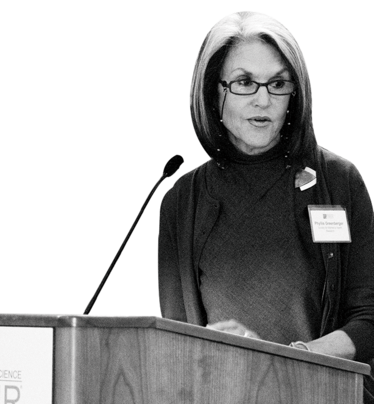Advocate of Change
Sitting Down With… Phyllis Greenberger, President and CEO of the Society for Women’s Health Research (SWHR), Washington, D.C., USA.

It must be rewarding to have been involved in SWHR from the start…
It’s very rewarding. And it’s been fun and exciting, partly because we look at so many conditions, from neurological conditions to cardiovascular. I have had the opportunity to work with so many researchers, academic centers, regulators, and government officials. And though every day has been a challenge, it’s always been interesting.
How was SWHR founded?
SWHR was founded in 1990 by a group of physicians, medical researchers and health advocates. Dr Florence Haseltine – who was working at the National Institutes of Health (NIH) at the time – realized that women’s health issues were almost entirely focused on reproductive issues, and maternal and pediatric medicine. Florence went to Congress and talked to them about the need to pay attention to the full range of health issues that women experience. In particular, we lobbied for an audit of NIH’s policies and practices regarding inclusion of women in clinical trials. As a result, President Clinton signed legislation in 1993 that established the Office of Women’s Health at the NIH, appropriated a significant amount of money for women’s health research, and mandated the inclusion of women in clinical trials.
And how did you become involved?
In the early 1990s, I was working for the American Psychiatric Association, and I was aware that women were not being adequately represented in clinical trials, particularly in areas like depression, which we knew disproportionately affected women. I was also working with a physician at NIH who invited me to a meeting on AIDS, where they discussed the fact that no one was paying attention to women; all the focus was on gay men and the only consideration for women was during pregnancy. Women weren’t even being included in clinical trials. That really captured my interest, so when Florence asked me to join the board of a new voluntary organization in 1990, I accepted. After that, I got involved in President Clinton’s first presidential campaign and was introduced to Hillary Clinton. I worked with Hillary’s staff on women’s issues and they really picked it up and made several speeches on the subject. That publicity set us on a path to become a fully-fledged organization, and in 1993 we were able to get properly off the ground.
What was the main focus of the Society in the early days?
We first focused on the inclusion of women and minorities in clinical trials. We worked with the handful of people at the FDA who supported what we were doing, to encourage inclusion of women in drug trials. In 1996, we went to the Institute of Medicine (IOM) and asked to do a report on sex differences in health and medicine. It was difficult to get the funding for it and there was a lot of pushback by people that didn’t believe in it, but the IOM report – “Exploring the Biological Contributions to Human Health: Does Sex Matter?” – came out in 2001. That gave us a more official document, which had to be taken seriously, and couldn’t be dismissed as simple political correctness. Before that, there was a general belief from pharma companies, researchers and regulators that men and women were pretty much the same and that if something worked on men it worked on women. It wasn’t until the IOM report came out that it became a much bigger issue – a number of researchers, many of whom we worked with and funded with small grants, started finding major differences between the sexes.
How does the Society promote research?
Our research networks bring together researchers from a range of disciplines to look at issues like Alzheimer’s, mental illness, pain and cardiovascular disease. They have been publishing papers in journals to educate researchers and physicians about sex differences. It’s interesting that when you bring all these people together from different disciplines and they start comparing notes, they often quickly find differences in diagnosis or treatment. We’re working hard to get enough funding to continue the research.
What’s next?
There’s still a lot of work that needs to be done. We’d like to start a fellowship for medical students, so that the next generation of doctors better understand sex differences, as it’s not really being taught in medical schools yet. There’s still a lot that we don’t know, but we want to make sure that new physicians can apply the knowledge we do have in clinical practice.
What do you love most about your job?
I always felt that I didn’t want to be just talking about one disease because that would get monotonous after a while. I enjoy being able to get involved in a lot of different issues and meet a lot of different people and, frankly, I like the challenge. It’s been difficult at times and extremely frustrating, but it’s been exciting as well.

As an Editor at Texere, I’m working closely with our audience to create vibrant, engaging content that reflects the hard work and passion that goes into bringing new medicines to market. I got my start in biomedical publishing as a commissioning editor for healthcare journals and have spent my career covering everything from early-stage research to clinical medicine, so I know my way around. And I can’t think of a more interesting, challenging or important area to be working in.



















